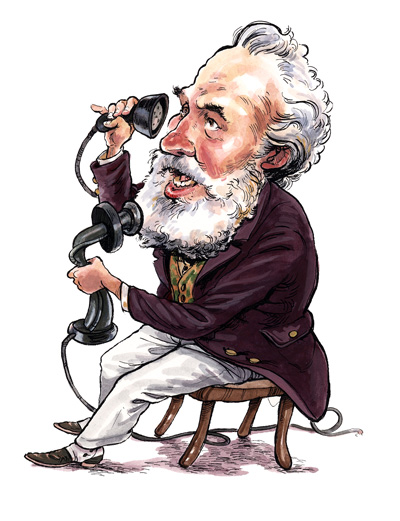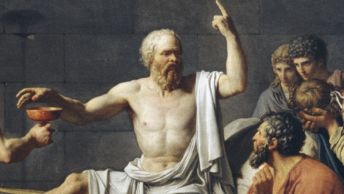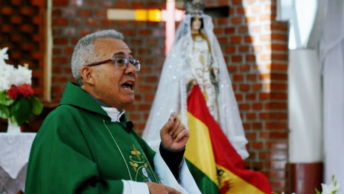
This is an exciting time of year for football fans. Most of the college bowl games have been played, and the NFL playoffs are beginning. Even many non-football fans have heard of one of the greatest football coaches ever, Vince Lombardi—the legendary leader of the Green Bay Packers. He once wrote a book about football called Run to Daylight. In the chapter on running backs, he made a point that’s actually a lesson for life. Lombardi described how a football team learns the different plays it’ll use in the upcoming game in order to advance the ball and score a touchdown, and then practices them over and over again, to the point where they become almost automatic. Running plays in particular require each player on offense to know, remember, and execute his blocking assignment. Lombardi wrote, however, that when the running back is handed the ball, everything happens so fast there’s time for him to remember just one thing: run to daylight. If the hole in the other team’s defense doesn’t open up where expected, but the running back sees daylight—that is, an opening in the defensive line somewhere else—that’s where he has to run (Sunday Sermon Treasury of Illustrations, p. 301).
This is a lesson for all of us. Life doesn’t always go according to plan; the goals we set, and the opportunities we hope for, quite often don’t make themselves available—but success can frequently be found somewhere else, if only we look for it. This is especially true in terms of faith, particularly as we live in a world darkened by sin, and find ourselves surrounded by doubt and temptation. Jesus is the true light of the world, and as long as we continue searching for and following Him, our ultimate success is assured.
The Feast of the Epiphany is meant to be a happy celebration, as illustrated in the words of rejoicing from the Book of the Prophet Isaiah:
Rise up in splendor, Jerusalem! Your light has come, the glory of the Lord shines upon you. . . . Nations shall walk by your light, and kings by your shining radiance.
God promised to send a Savior into a world darkened by sin, and St. Paul states that this promise of salvation is intended for everyone, Jew and Gentile alike. However, everything depends on whether or not we’ll accept this gift. The magi, or wise men, saw the wondrous light of a star and felt a joyful compulsion to follow it, recognizing it as the herald of a newborn king. King Herod, however, did not receive this news in a spirit of openness and trust; the Gospel tells us that he and the religious and political elite were greatly troubled. Instead of joyfully seeking the light, as the magi did, he chose the way of darkness. Evil persons find themselves threatened by the light of divine love and truth, and they usually flee from it, or even try to extinguish it. Those who travel the way of righteousness, however, welcome the light—for it allows them to discover and fulfill their purpose in life, and to find freedom and peace by giving of themselves, just as the magi generously presented their gifts to Jesus and His parents.
The inventor of the telegraph, Samuel Morse, was a devout Christian, and in fact the first message he sent in 1844 on his new invention was “What has God wrought!” Morse’s invention brought him world-wide fame and success, and years later, in an interview, he was asked if he had ever experienced obstacles and problems in his efforts to create the telegraph. “Oh, yes, more than once,” he said, and when asked what he did on those occasions, he answered, “I prayed for more light.” When the interviewer inquired, “Did the light come?,” Morse said, “Yes. And may I tell you that when flattering honors come to me from America and Europe on account of the invention that bears my name, I never felt I deserved them? I had made a valuable application of electricity, not because I was superior to other men, but solely because God, Who meant it for mankind, must reveal it to someone, and was pleased to reveal it to me” (Knight’s Master Book of 4000 Illustrations, p. 370). This simple story illustrates the important truth that while God is pleased to share His light with us, we for our part must be willing to accept it with gratitude and humility, and then share it with others.
A few weeks ago, on December 21, we experienced the shortest day of the year—the winter solstice, on which there’s a minimal amount of sunlight. On every day since then, the sun is progressively rising a few minutes earlier, and setting a few minutes later. We live in a world darkened by sin, a world in which even many of those who would never knowingly give themselves over to evil are groping and wandering in a seemingly permanent state of shadows and twilight. The world unknowingly but desperately needs the light which Jesus alone can give. Our Lord calls all of us, as His followers, to reflect this light. Through our love, our example, and our prayers, we can help slowly lift the gloom and make the world around us a brighter place—bit by bit, just as each day the sun is shining a little longer. Humility, gratitude, and a faith that’s made real through our love and our prayers, demonstrates our willingness to run to daylight, and our allegiance to Jesus as the true light of the world.
Darkness often seems to have the upper hand, but it has no creative power of its own, and must retreat whenever the light advances. The magi knew and accepted this truth, and were rewarded with the opportunity to worship the newborn King. Herod rejected the opportunity to step into the light, and is therefore now cast into the outer darkness of eternal agony and regret. Everyone on earth, including ourselves, our loved ones, and all the people we personally influence or encounter, must make this same choice. Jesus is the true light of the world, and we can only find our way successfully through life by allowing His light to shine in our hearts.








